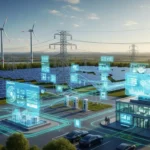In the pursuit of a cleaner and more sustainable energy future, fuel cells have emerged as a promising technology that holds the potential to transform the way we generate and consume power. These versatile and efficient devices can harness the power of chemical reactions to produce electricity, offering a cleaner and more efficient alternative to traditional combustion-based energy sources. As the world grapples with the urgent requirement to decrease carbon emissions and transition to renewable energy, fuel cells are shining a light on the path towards a cleaner and more resilient energy landscape.
Energy Transformation with Fuel Cells
At the heart of fuel cell technology lies the concept of electrochemical conversion. This process generates electricity through chemical responses involving hydrogen and oxygen. Hydrogen, the primary fuel for most fuel cells, is combined with oxygen from the air to build electricity, heat, and water as byproducts. This elegant process produces electricity with minimal environmental impact, making fuel cells a clean and efficient energy solution.
Fuel cells come in various types, including proton exchange membrane (PEM), solid oxide, molten carbonate, and more. Each type is optimized for specific applications, from stationary power generation to transportation and portable devices. This versatility underscores the potential of fuel cells to revolutionize multiple sectors of the economy.
The Clean Energy Promise
One of the most compelling advantages of fuel cells is their potential to significantly reduce greenhouse gas emissions and air pollution. Unlike traditional combustion engines, which burn fossil fuels and release harmful pollutants, fuel cells produce electricity without harmful emissions. The only byproducts of the electrochemical reaction are heat and water vapor, which are environmentally benign.
It offers a game-changing solution in sectors such as transportation, where emissions from internal combustion engines significantly contribute to air pollution and climate change. Hydrogen fuel cell vehicles emit only water vapor and warm air, making them a zero-emission alternative that can help combat urban smog and improve air quality.
Driving Sustainable Transportation
Fuel cell vehicles (FCVs) represent a promising frontier in sustainable transportation. FCVs combine conventional vehicles’ range and refueling convenience with the environmental benefits of hydrogen fuel cells. These vehicles are fueled by hydrogen gas, which can be made using renewable sources such as hydroelectric power powered by wind or solar energy.
Adopting FCVs reduces carbon emissions and addresses the energy storage challenge in the transportation sector. Hydrogen can be produced, stored, and transported efficiently, offering a solution to the intermittency of renewable energy sources and contributing to a more flexible and resilient energy grid.
Decentralized Power Generation
Fuel cells also hold great potential for decentralized power generation. By using fuel cells in combined heat and power (CHP) systems, buildings can produce electricity and heat simultaneously, making them more energy-efficient and reducing the strain on centralized power grids. Fuel cells’ compact size and modular nature make them suitable for various applications, from residential homes to industrial facilities.
Moreover, it solves energy security challenges by providing backup power during grid outages. This capability enhances the resilience of critical facilities such as hospitals, data centers, and emergency shelters, ensuring continuous power supply when needed most.
Overcoming Challenges
While the promise of fuel cells is clear, challenges remain that need to be addressed for their widespread adoption. One significant challenge is the development of a hydrogen infrastructure, including production, storage, distribution, and refueling stations. Building a robust and accessible hydrogen infrastructure is essential to support the growth of fuel cell technology, particularly in the transportation sector.
Additionally, fuel cell technology costs must be further reduced to make it competitive with other energy options. Advances in materials, manufacturing techniques, and research and development are critical to achieving this goal and unlocking fuel cells’ full potential.
Conclusion
Fuel cells pave the way toward a cleaner, more sustainable energy horizon. They offer a path to reducing carbon emissions, improving air quality, and enhancing energy security across sectors. From transportation to power generation, fuel cells hold the potential to reshape our energy landscape, decrease our reliance on fossil fuels, and mitigate the outcomes of climate change.
As we navigate the challenges of the 21st century, it stands as a testament to human ingenuity and the capacity to innovate in pursuit of a better future. By embracing this versatile and efficient technology, we can forge a path toward a cleaner, greener, and more resilient energy future that benefits both current and future generations. As the world faces the dual imperatives of energy security and environmental stewardship, they are lighting the way forward, illuminating a path toward a more sustainable and prosperous world.





